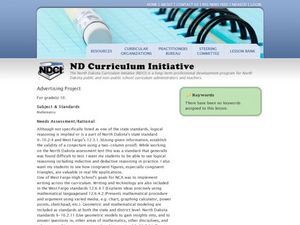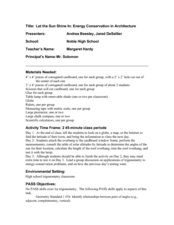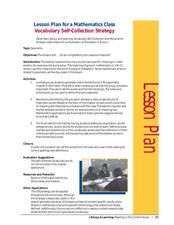Virginia Department of Education
Inductive and Deductive Reasoning
Introduce pupils to the two types of reasoning, inductive and deductive. Classmates work in pairs or small groups to learn the difference between the two and apply these reasonings to develop valid conclusions.
Curated OER
House and Holmes: A Guide to Deductive and Inductive Reasoning
Test your pupils' reasoning skills with several activities and a quick mystery to solve. Learners watch and analyze a few video clips that demonstrate reasoning in action, practice deduction with an interactive and collaborative...
Curated OER
Deductive and Inductive Reasoning
Students differentiate between inductive and deductive reasoning. In this geometry lesson, students identify congruent figures and examine logos for congruency.
Curated OER
SuperShapes, Part 1; "Tri"ing Triangles
An outstanding lesson on triangles awaits your math scholars. Learners focus on the triangle, which is the strongest of all polygons. They see the role that triangles play in the design of buildings, and learn about triangle...
Curated OER
Inductive vs. Deductive Proof
Twelfth graders differentiate between inductive and deductive proofs. In this differentiating between inductive and deductive proofs lesson, 12th graders compare strengths and weaknesses of each type of proof. Students...
Curated OER
Logic and Proof Writing
Students define inductive and deductive reasoning and write two column proofs. In this geometry lesson plan, students analyze arguments and draw conclusion. They define steps necessary to arrive at the correct answer when completing proofs.
Curated OER
Let the Sun Shine In: Energy Conservation
Learners create a project applying their math skills as they discuss energy conservation. For this geometry lesson, students define vocabulary relating to the environment and energy conservation. They construct a building that allow lots...
Buffalo State
Adding and Subtracting Integers Unit
Just because one integer is larger than another doesn't mean it will make sense right away. Go beyond note taking and show learners, through the use of algebra tiles and a Four-Pan Algebra Balance, how the numbers relate to one...
Curated OER
Get Your Numbers in Shape - TI-83
High Schoolers use the TI-83 calculator to produce a sequence, explore patterns and find a linear or quadratic equation for a given pattern. They use inductive reasoning to make conjectures about patterns. They find the Y-value of a...
Curated OER
Income Levels & Social Class: Is It All About Cash?
Young scholars graph data and interpret that data after reading information about lifestyles and income levels. They calculate percentages, set up spreadsheets and calculate columnar data.
Curated OER
Muppet Math Patterning
Pupils participate in determining the completion of patterns and discovering which part of the pattern doesn?????™t belong.
Curated OER
Number Dribble
Students dribble and catch a ball. In this number dribble lesson students are given numbers and math equations that require them to dribble or throw the ball a specific number of times. The students practice dribbling independently and...
Curated OER
SQRQCQ
Fifth graders discover a method to solve word problems. In this 5thgrade math lesson, 5th graders learn the steps of SQRQCQ (survey, question, reread, question, compute, question. Students practice using the method to solve word problems.
Curated OER
Vocabulary Self-Collection Strategy
Dedicate one or two class periods to creating a class glossary of geometry terms. Many geometry terms also appear in our every day vocabulary, but they have very different meanings. For example, the word gross in geometry is very...
Curated OER
Arithmetic Chains
Learners complete a chain of numbers given the outcome. In this geometry lesson, student use deductive and inductive reasoning to solve problems. They create a formula and ways to predict numbers in the chain without starting over.
Curated OER
Slope Lesson Plan
Students identify the relationship between relations and functions. In this algebra lesson, students investigate and find the slope of a line using a graph, 2 points and an equation. They calculate the slope from a set a data points...
Curated OER
Symmetry, Similar & Congruent Shapes
Fifth graders identify lines of symmetry., similar and congruent shapes. They use construction paper to create their own symmetrical shapes. Students create stained glass frames containing symmetrical, congruent and similar shapes.
National Security Agency
Multiple Representations of Limits
After an introductory activity to demonstrate the theory of a limit, additional activities approach a limit from graphical, numerical, and algebraic methods. The activity looks at the multiple ways of understanding and evaluating a...
Curated OER
Pythagorean Theorem by Graphic Manipulation
There are many different ways to show a proof of the Pythagorean Theorem. Here is a nice hands-on paper cutting activity that shows a graphic representation. You can even challenge your young Pythagoreans to come up with their own...
Curated OER
Interdisciplinary Lesson Plan- Math
Students perform locomotor movement. In this locomotor skills lesson, students practice running, hopping, skipping, and walking then form themselves into groups based on a number called out. Students identify if more or less...
Curated OER
Morphemic Analysis
Young scholars analyze content area vocabulary. In this content area literacy lesson, students list math words they are unfamiliar with and identify morphemes found in those words that are found in other words. Once they have a list of...
Curated OER
nvestigation - Justin and Daniel's Puzzles
Seventh graders explore area and perimeter, using tangram pieces. They discover the area and perimeter of rectangles and squares. After experimentation, 7th graders write a rule for finding the perimeter and area of squares and rectangles.
Curated OER
Discovering Euler's Theorem
Students identify different parts of a prism and polyhedra. In this geometry lesson, students identify the number of faces, edges and sides of polygons. They solve problems by recognizing patterns.
Curated OER
Making a Two - Colorable Map
Students make a two - colorable map by following directions given to them. In this map lesson plan, students follow 5 sets of directions and discuss their activity.























